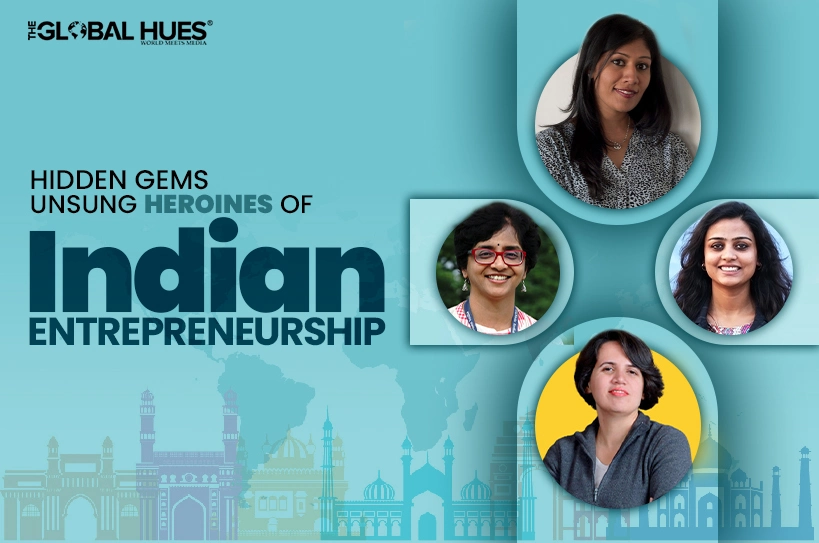When we talk about women entrepreneurship in India, we refer to the incredible women who are changing the view of the business environment. Beyond the famous names like Kiran Mazumdar-Shaw and Indra Nooyi, there are women across various fields—be it beauty and wellness, finance, technology, social work, or any other—who are making significant contributions and working tirelessly to improve lives and elevate India’s economy. Overlooking them is like ignoring a powerful force of progress and inspiration.
There has been an uptick, but female entrepreneurs still confront a number of obstacles. Some examples of these difficulties include societal taboos, gender discrimination, and diminished personal financial resources. Below, find the list of Indian women business owners who have broken barriers, taken chances, and achieved great success.
-
Ajaita Shah – Building a Greener Tomorrow with Frontier Markets
Frontier Markets founder Ajaita Shah has developed reasonably priced solar energy solutions specifically for rural India. Her enterprise enables “Saral Jeevan Sahelis, a rural woman, to operate as a solar entrepreneur, therefore supplying consistent, clean energy to households all around communities.
One unique feature of Frontier Markets is that women make up all of their sales staff. Commission on product sales and service fees for maintenance and repairs brings these Sahelis revenue. Additionally, they get a predetermined stipend for marketing initiatives and compiling insightful consumer information.
Ajaita’s journey was not without challenges. She often had to justify the risks she was taking to her family and society, navigating a path that women in rural enterprise rarely trod. Beyond societal expectations, she faced practical obstacles like limited access to capital, a lack of established networks, and scarce resources for innovation—all common hurdles that restrict the growth of social enterprises. Yet, through her resilience and determination, Ajaita not only expanded energy access in underserved communities but also created sustainable livelihoods for rural women.
-
Upasana Taku – Revolutionizing Payments with MobiKwik
Coming from a traditional Indian family, Upasana Taku pursued her education in engineering. Later, she completed her master’s degree in management at Stanford University, arming her with the knowledge for navigating the fintech industry in India. Now servicing around 150 million customers, she co-founded MobiKwik, one of the most well-known mobile wallets in India and among the top Indian startups. With a mission to bring digital payments to India’s masses, MobiKwik enables easy and secure financial transactions for millions.
With the Reserve Bank of India predicting a nearly threefold growth in digital transactions over the next five years, MobiKwik plays a key role in expanding financial access to unbanked populations. Upasana’s efforts are helping create a financially inclusive society, bridging the digital divide across India’s urban and rural landscapes.
-
Shanti Raghavan – Championing Inclusion with EnAble India
Shanti Raghavan is next on our list of India’s empowering women. Her journey started with a very personal experience—her brother had blindness at the age of 15, which motivated her to co-found EnAble India in 1999. A platform that centers on generating job possibilities for people with impairments. By providing meaningful employment, Enable India’s training and placement initiatives have effectively linked a good number of people with disabilities.
Shanti’s organization works with businesses to apply inclusive hiring policies, therefore enabling everyone to have access to workplaces. Business Today identified her as one of the Most Powerful Women in Business, and she is a Schwab Social Innovator as well. Her efforts show how commitment and empathy may lead to long-lasting transformation.
-
Aditi Gupta – Educating Millions through Menstrupedia
Aditi Gupta was 12 when she received her first period, and everyone advised her to hide it. Her closest Indian relatives didn’t know. She was barred from temple worship when menstruation and used rags that caused sores. “When girls [in India] get their periods, they are considered impure for 7 days,” Gupta tells TIME. I grew up considering myself unclean. That humiliation was implanted in me early on.”
However, Aditi Gupta is now breaking down the walls with Menstrupedia, an informative site that millions of people visit every month. The job that Aditi does to teach young girls and encourage open communication is to make the next generation healthy and smarter.
-
Ria Sharma – Advocating for Acid Attack Survivors with Make Love Not Scars
Ria Sharma started Make Love Not Scars (MLNS) to help people who have been through acid attacks by giving them vital resources and psychological support. There are 250–300 acid assaults in India annually, and many of the victims suffer psychological and bodily harm as a result.
Ria’s organization not only helps survivors but also brings more attention to acid attacks, which has led to talks about making it harder to sell acid. Finally, her work is a great example of the possibilities of social entrepreneurship: compassion can help someone in the worst situations possible.
-
Falguni Nayar – Leading a Beauty Revolution with Nykaa
Have you ever felt grateful for how easy Nykaa makes it to buy your favorite beauty and wellness products in just minutes? All credit goes to Falguni Nayar, India’s first self-made female unicorn entrepreneur, who has redefined women’s entrepreneurship by launching this successful app, which sees 1.5 million daily visitors.
Like anyone with dreams, Falguni Nayar once thought of starting her own business and launched nykaa in 2012, which is now one of the top Indian startups. Additionally, her strategy revolves around gaining customers’ trust and being smart about money.
-
Priya Paul – Transforming Indian Hospitality with The Park Hotels
Priya Paul turned The Park Hotels into a dynamic, luxurious brand with a special eye on design, art, culture, diversity and inclusion. India gets 4.2 million international tourists annually, and the count is increasing rapidly, which makes the tourism sector a leading industry, and travelers are now seeking more Real hospitality. Under Priya’s direction, The Park Hotels developed original ideas and established themselves as trendsetters in the boutique hotel industry.
The Park Hotels have sponsored several art and music events, therefore enhancing India’s cultural scene in line with their commitment to diversity and inclusiveness. Priya’s path shows how contemporary ideas may revitalize age-old businesses.
-
Anu Acharya – Pioneering Genomics with Mapmygenome
Anu Acharya is the CEO of Mapmygenome India, a genomics business that makes DNA testing easy for people to get in order to stay healthy. In 2013, she brought the idea of better health care through personal genetics to India. Since then, she has led the company to success by adding new products, growing the affiliate network, and raising money in a Pre-Series A round. The company has won a lot of awards and honors because of how well she runs it.
In a place where preventive healthcare is often limited, Anu’s business brings together technology and healthcare to make genomic findings more accessible and useful. Her work is changing the way people think about their health and laying a strong basis for genetics in India.
Conclusion
The unsung heroines of Indian women’s entrepreneurship are revolutionizing sectors and changing societal mores. Although women-owned companies create over 13 million jobs across India’s economy, many women entrepreneurs are still underappreciated. Celebrating these hidden treasures will help us to encourage a fresh generation of women-led businesses.
From tackling societal taboos to trailblazing new technology, these women are evidence of the strength of tenacity, compassion, and the need for diversity and inclusion. Appreciating their work means building a society that motivates more women all around to follow their entrepreneurial aspirations.




